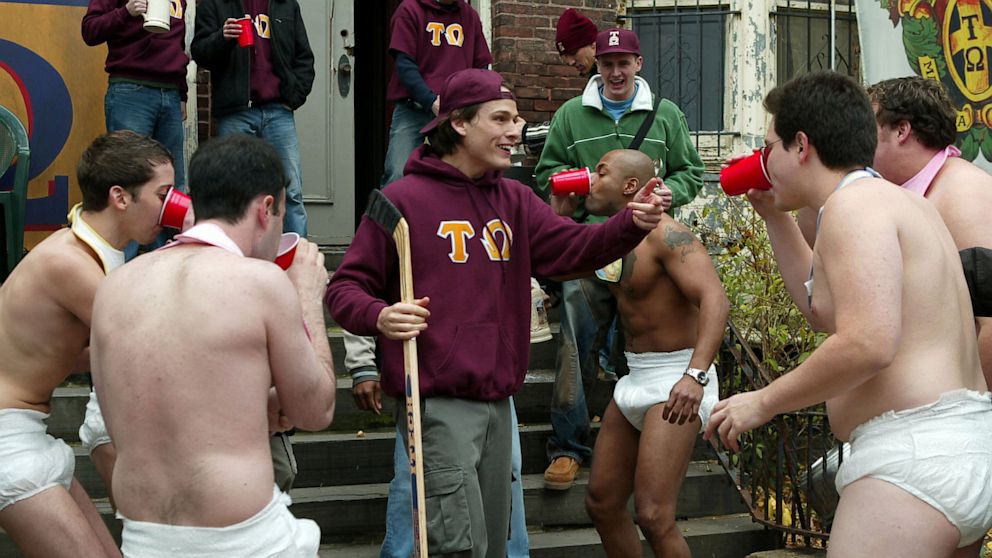Fraternity Group Seeks to Shape Hazing Reform
Fraternity and sorority lobbying, FratPAC, aims to derail anti-hazing proposals.

July 25, 2013 -- Using a #2 pencil, circle the word in the following sequence that does not belong:
"Fraternity," "Sorority," "Serious."
It's a trick question. They all belong. On college campuses today, undergraduate membership organizations are under an unforgiving microscope. Booze is out. Hazing is out. Inappropriate sexual behavior, of course, is out.
Gone, too, is the kind of "involuntary servitude" implied in the command: "Mellman, you miserable worm, get down to Rumplemeyer's and buy me a macaroon."
But scavenger hunts?! Boy, when scavenger hunts are out, you know it's serious.
The rationale for forbidding them at some colleges, explains an expert on college-fraternity relations, is two-fold: The hunt might demean the persons compelled to scavange; and the items sought, if inappropriate and later depicted online, might incite outrage.
It follows, then, that any organization attempting to stick up for frats and sororities has its work cut out; and FratPAC (the Fraternity and Sorority Political Action Committee), plainly does.
FratPAC lobbies on behalf of the 652,000 undergraduate members of the Fraternal Government Relations Coalition (FGRC). The PAC tells ABC News it raised just over $500,000 in the last congressional cycle, which, according to an independent estimate, would put the group in the top 10 percent of PACS, excluding Super PACS.
Kevin O'Neill, partner in the law firm Patton Boggs LLP, is executive director of FratPAC. He tells ABC News the organization came into being in 2005, in part as a response to a changing political and demographic landscape: For four decades prior to that, he says, the vast majority of Congressmen and Senators were fraternity/sorority members. Today, by his count, only 145 members of the House and Senate are (only 27 percent). "We thought it important that government have more Greeks," he explains.
Why?
Because, he thinks, sorority and fraternity members are by nature leaders; they know how to cooperate with one another and "work across the aisle." He and Pete Smithhisler, president and CEO of the North-American Interfraternity Conference, describe fraternities and sororities as constituting "the nation's largest network of collegiate volunteers" and as being "the most successful leadership development program for college students."
The two men and their respective organizations do not make light of the problem of hazing, or any of the other serious issues fraternities and sororities now confront. "If somebody commits physical harm," says Smithhisler, "he should have the book thrown at him."
At the same time, FGRC, through FratPAC, seeks to protect their undergraduate members from (figuratively speaking) the Dean Wormers of the world—any legislator or college administrator who might seek to deny a student accused of hazing due process. Some pending legislation, says O'Neill, fails to distinguish between different kinds of hazing, painting it all with the same broad brush. "You want to deal differently with the small infractions than with the big," he argues.
A recent story by Bloomberg says FratPAC brought pressure on U.S. Representative Frederica Wilson of Florida, who had announced her intention to introduce legislation that would deny financial aid to any student engaged in hazing. Her legislation, by her account, was prompted in part by the death of Harrison Kowiak, a Florida college student beaten to death during a hazing ritual.
FGRC tells ABC it stands opposed to hazing in all its forms, and that it has made the eradication of hazing a serious part of its agenda.
Smithhisler says FratPAC did contact Wilson about her bill. It's unfortunate, he says, that the PAC is being depicted as opposed to Wilson's legislation, whereas all it wants to do is make the bill better and more effective.
Bloomberg quotes Wilson as denying FratPAC blocked her bill.
She insists she remains committed to it. There are, though, "some hiccups in the bill," as it relates to penalties, she tells Bloomberg. She has since become a co-sponsor of legislation that would allow increased spending of charitable dollars to renovate chapter houses of fraternities and sororities.
FratPAC confirms Wilson accepted a $1,000 campaign contribution from it last election cycle.




